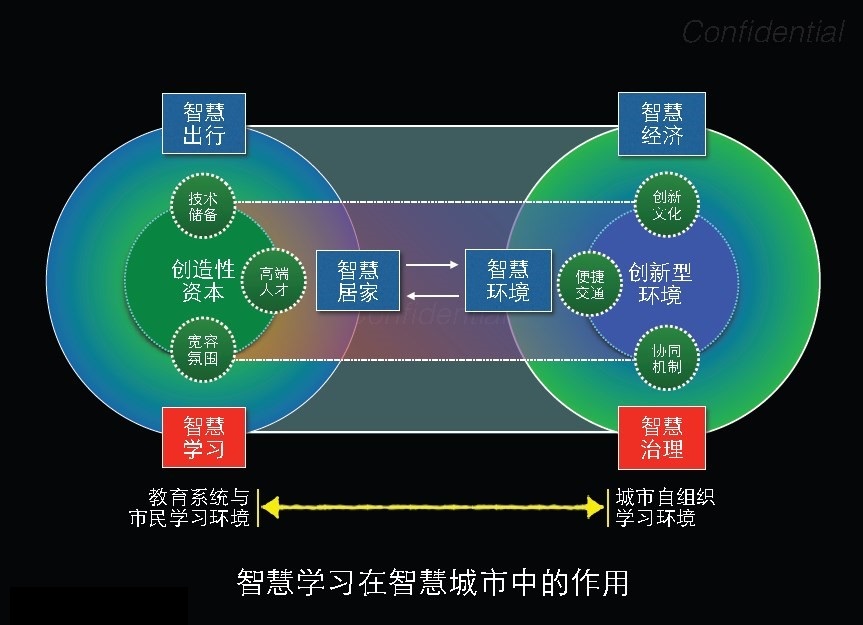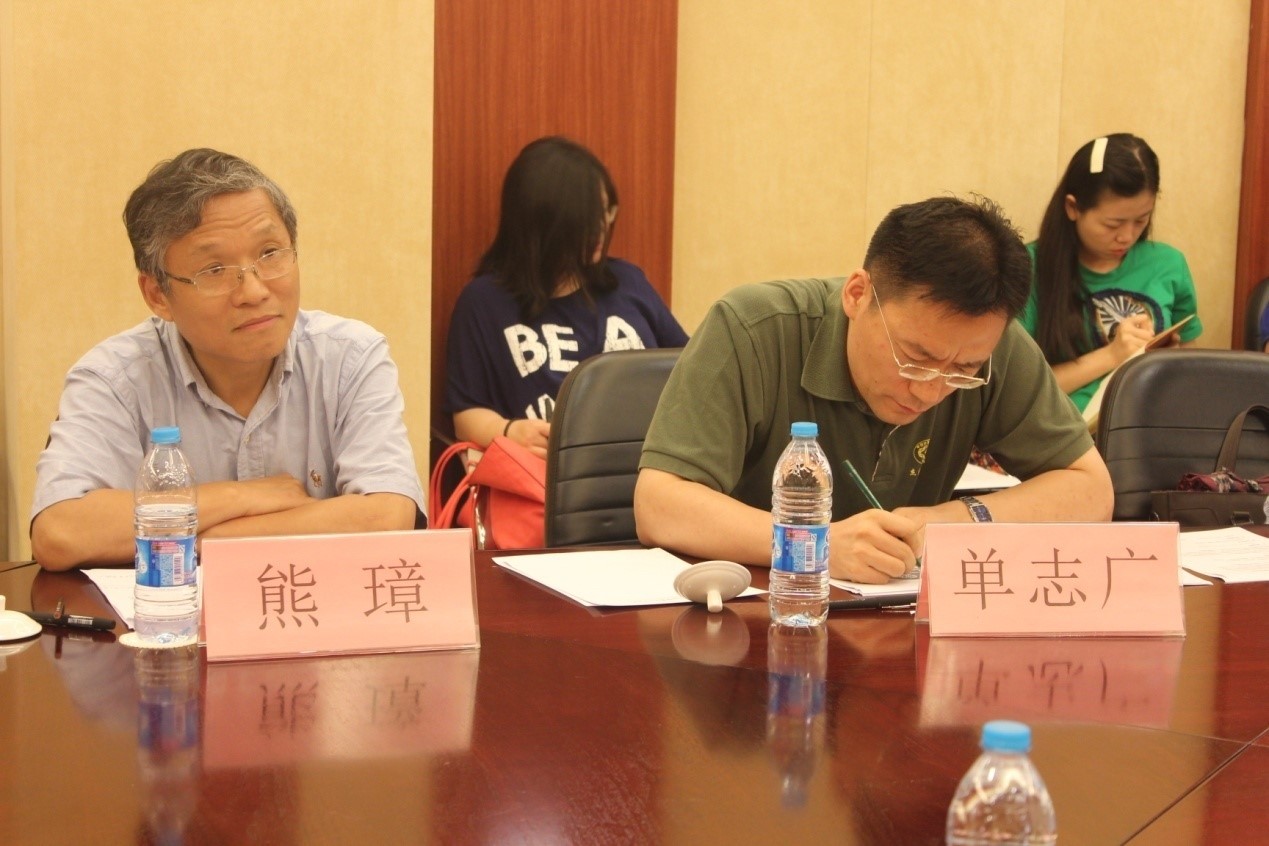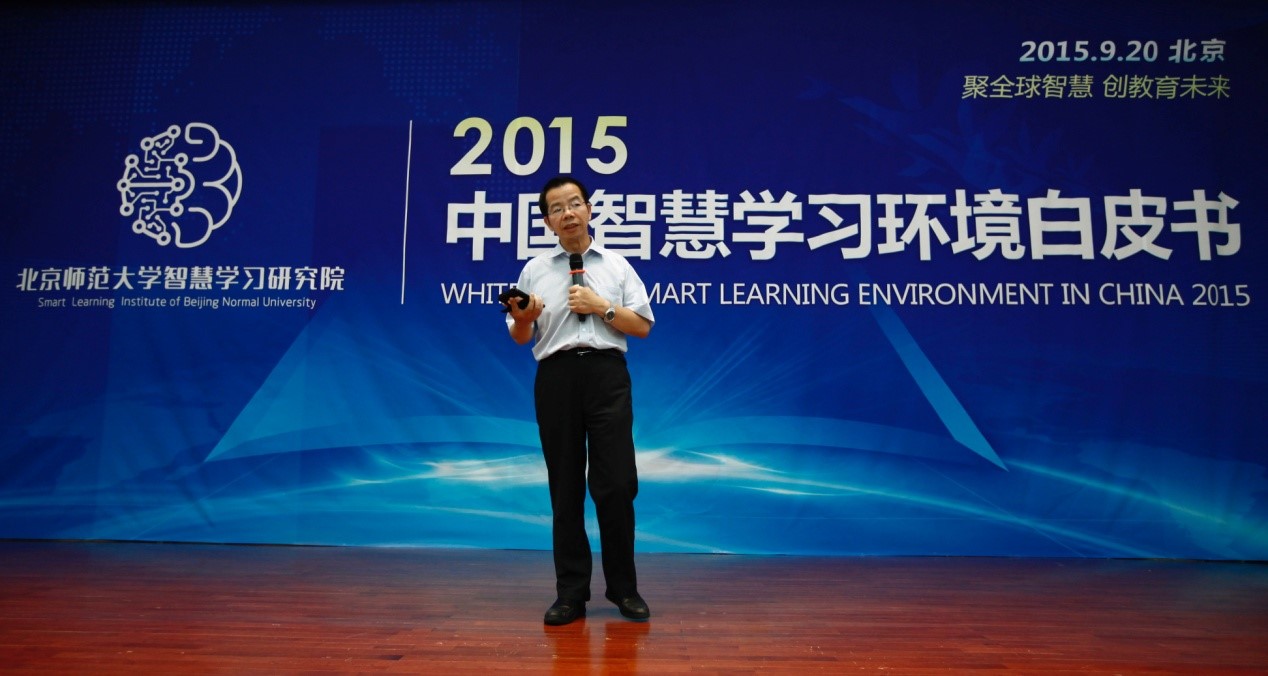White Paper: Smart Learning Environments in China 2015 - the abstract edition
White Paper:Smart Learning Environments in China project was led by Smart Learning Institute of Beijing Normal University and was funded and involved in organizing by NetDragon Huayu Education Incorporation. The paper was co-finished by nearly 30 experts and scholars from colleges, universities and scientific research institutions in the fields of pedagogy, psychology, education informatization, smart city and so on. The paper comprehensively interprets smart learning and smart learning environment from the perspective of smart city construction and development, acquires basic data information in the domestic administrative region, monitors development of smart learning environment and carries out extensive industry surveys, reflecting the development level of Chinese smart learning environment through real data.
The first White Paper issued ten core ideas of China smart learning environment development, namely: (1) Learning in the information age will be mainly based on smart learning environment. Smart learning environment can meet people’s needs of learning at any time, any place, any pace and in any way to support learners in relaxing, devoted and effective learning. (2) " Citizens’ habitable experience " and "cities’ innovative ability" are “two engines” of smart city construction and development. Moreover, smart learning environment is one of the important foundations of “citizens’ habitable experience” in cities. (3) With the advancement of smart city construction and continuous increase of social education supply, the value of family learning, community learning and enterprise learning is increasingly obvious. The three kinds of learning become important parts of lifelong learning, together with school learning. (4) As the high-end form of digital campus, smart campus will provide students with smart learning environment for the "digital natives" on campus. Smart campus construction should be an important part of smart city construction and fill the gap between school informatization and city informatization. (5) The continuous progress of series of national education informatization projects has provided most students with technology environment which supports digital learning. "Cloud + Terminal" will become the mainstream of smart campus. Therefore, supportive service ability and information security are the bottleneck to break for school education informatization construction. (6) To cater for "digital natives’" natural appeal of new ways of learning, schools are actively optimizing classroom environment, enriching supply of digital resources and enhancing students’ "smart" learning experience. New learning space will expand the physical space of classroom and break the class boundary. The different management of students and learning activity design will be the focus of classroom teaching in the future. (7) Interactive electronic whiteboard and tablet personal computer are gradually entering classroom. Regional survey suggests that students in multimedia classroom and "interactive whiteboard" classroom have less “smart” learning experience compared with "tablet personal computer" classrooms and computer classrooms. The design and optimization of classroom environment will become the important research domain that education equipment, informatization, teaching and research departments jointly research. (8) Embedding smart learning in corporate university or corporate human resource security system is the basis of constructing modern enterprise and promoting city innovative ability, which will strongly promote our country to become a power from a big country into a power in manufacturing industry. (9) Mobile Internet technology, intelligent robot technology and "Internet +" strategy are creating "smart learning" industry, providing products, technologies and services for school, family, community and enterprise learning. (10) “Smart learning” should become the core part of smart city construction in that it is a strong support of citizens’ lifelong learning and also a key feature of city system "self-evolution". Developing "smart learning" can not only enhance citizens’ habitable experience but also promote the innovative ability of city. It is the "smart" quality of a city.
The project will continue and subsequently will focus on smart learning in cities, track the process of smart city construction and education informatization as well as timely and authoritatively interpret and release information including smart learning, national policy of smart education, key projects, infrastructure, typical cases, large-scale teaching application, user demand, market scale, solution, product characteristics, development opportunities and so on.

Figure 1. Smart Learning and Smart City Diagram

Figure 2 White Paper Expert Seminar

Figure 3 First Conference of the White Paper
The first White Paper issued ten core ideas of China smart learning environment development, namely: (1) Learning in the information age will be mainly based on smart learning environment. Smart learning environment can meet people’s needs of learning at any time, any place, any pace and in any way to support learners in relaxing, devoted and effective learning. (2) " Citizens’ habitable experience " and "cities’ innovative ability" are “two engines” of smart city construction and development. Moreover, smart learning environment is one of the important foundations of “citizens’ habitable experience” in cities. (3) With the advancement of smart city construction and continuous increase of social education supply, the value of family learning, community learning and enterprise learning is increasingly obvious. The three kinds of learning become important parts of lifelong learning, together with school learning. (4) As the high-end form of digital campus, smart campus will provide students with smart learning environment for the "digital natives" on campus. Smart campus construction should be an important part of smart city construction and fill the gap between school informatization and city informatization. (5) The continuous progress of series of national education informatization projects has provided most students with technology environment which supports digital learning. "Cloud + Terminal" will become the mainstream of smart campus. Therefore, supportive service ability and information security are the bottleneck to break for school education informatization construction. (6) To cater for "digital natives’" natural appeal of new ways of learning, schools are actively optimizing classroom environment, enriching supply of digital resources and enhancing students’ "smart" learning experience. New learning space will expand the physical space of classroom and break the class boundary. The different management of students and learning activity design will be the focus of classroom teaching in the future. (7) Interactive electronic whiteboard and tablet personal computer are gradually entering classroom. Regional survey suggests that students in multimedia classroom and "interactive whiteboard" classroom have less “smart” learning experience compared with "tablet personal computer" classrooms and computer classrooms. The design and optimization of classroom environment will become the important research domain that education equipment, informatization, teaching and research departments jointly research. (8) Embedding smart learning in corporate university or corporate human resource security system is the basis of constructing modern enterprise and promoting city innovative ability, which will strongly promote our country to become a power from a big country into a power in manufacturing industry. (9) Mobile Internet technology, intelligent robot technology and "Internet +" strategy are creating "smart learning" industry, providing products, technologies and services for school, family, community and enterprise learning. (10) “Smart learning” should become the core part of smart city construction in that it is a strong support of citizens’ lifelong learning and also a key feature of city system "self-evolution". Developing "smart learning" can not only enhance citizens’ habitable experience but also promote the innovative ability of city. It is the "smart" quality of a city.
The project will continue and subsequently will focus on smart learning in cities, track the process of smart city construction and education informatization as well as timely and authoritatively interpret and release information including smart learning, national policy of smart education, key projects, infrastructure, typical cases, large-scale teaching application, user demand, market scale, solution, product characteristics, development opportunities and so on.

Figure 1. Smart Learning and Smart City Diagram

Figure 2 White Paper Expert Seminar

Figure 3 First Conference of the White Paper

